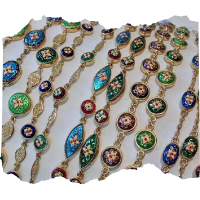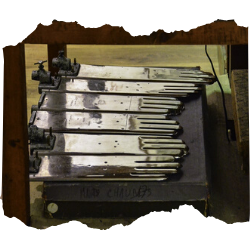Fascinated by Gallo-Roman history? Click Here to download > > > Here are 6 ways Rome affected France
- Home ›
- Ze French ›
- Daily Life in France ›
- Shopping in France
the art of shopping in France like an artiste
By Guillemette Rony*
NOTE: Pages on this site may contain affiliate links, which bring in a small commission at no cost to you.
Have you ever walked into a French shop and felt frustrated at the lack of attention from the staff? Or been snubbed at the counter even though it was your turn?
Well, there might be a reason that happened... Better yet, you can fix it!
Shopping in France is a cultural experience. It has its own set of unspoken rules and secret codes which guest blogger Guillemette Rony, who comes from Lyon, will help us decipher so that next time you shop in this country, you'll be welcomed with open arms. (Well, a smile, at least!)
Here's how to shop in France like an artiste!
Shopping in France: Etiquette for tourists
Deciding what to buy in France isn't the issue: it's HOW to buy it.
Interestingly, shopping etiquette in France is no different for tourists than it is for locals, in all the best French cities. If you do as we do, you'll be fine.
Always say Bonjour and Au Revoir
The first ground rule when entering a shop is to say ‘Bonjour’ (hello) Madame or Monsieur. It is considered respectful.
Of course, if you're entering a big department store or supermarket and there are no sales assistant nearby, you don't have to do this, obviously.
But if you do see a salesperson or if you visit a small shop, you are expected to say Bonjour in French, as a sign of respect, but also to let them know you’ve entered.
If you unwittingly neglect this little custom, not only will you be ignored, but you might be brought to task like a child in school, scolded with a firm BONJOUR which is perfectly clear in its intent.
The same goes for when you leave the premises: a nice Au Revoir (goodbye) will be appreciated, and reciprocated.
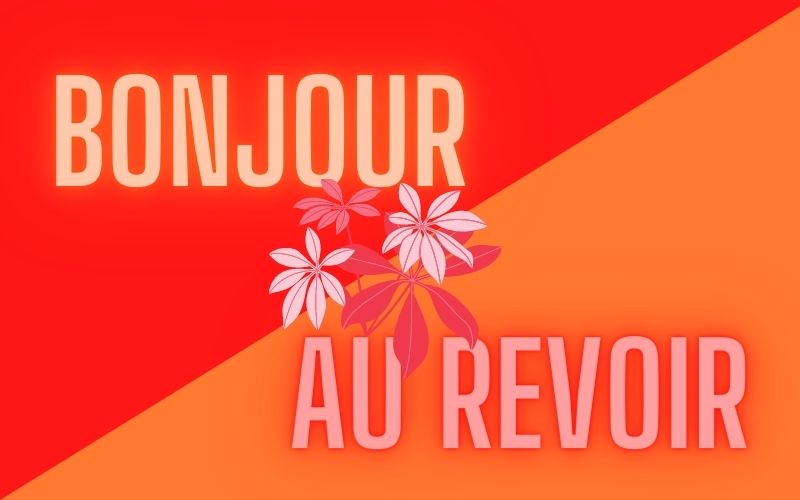 Shopping etiquette in France always includes these two words
Shopping etiquette in France always includes these two wordsApplying this basic rule of French etiquette will ensure you have better service, but be aware that the customer is not king in France. However polite you are, you may still run into sales staff who seem to care about everything but your presence.
How to deal with shop assistants in France
A salesperson in France may approach you more quickly than you are used to. They are not necessarily being pushy and in many cases feel they are being helpful: customers in France often have a specific idea of what they want and by approaching you immediately, a sales person is providing you with what they see as good service.
These handy phrases will help you respond to their attentions:
- "Merci, je veux juste regarder." Thank you, I’m just looking. Or you can even simplify it: "Je regarde, merci." I'm looking, thank you. Less polite, but easier to say.
- "Oui, je cherche... s'il vous plaît." Yes, I'm looking for... please."
Is there a return policy in France?
If you have made a purchase mistake when shopping in France, you may want to return or exchange it, the way you would do at home.
Well, this may not be possible. Small shops rarely accept returns, although you may be able to exchange certain things if they are in impeccable state, still wrapped and obviously unused. If you bought something during the sales, there's every chance it's now yours forever.
Department stores sometimes have more lenient policies and a few even accept returns on certain items so if you're not sure of what you need, check out the department store policy. If you're buying a gift that someone may already have, ask if you can exchange it if you find out it's a duplicate. You may be allowed to do so if you ask in advance.

Depending on the shops, you may have up to 14 days to return the merchandise (as long as it's not on sale) if the article hasn’t been used or opened and still has its tag.
So as a general rule, it is always better to be sure before buying.
When to shop in France
Don't think you can rush out on a Sunday and pick up the shopping you've neglected all week... you may be in for a surprise.
Regulated opening hours in France
Shop opening hours and working hours in France are highly regulated by law.
Unless specifically authorised, a shop cannot open before 6 am or stay open past 10 pm, from Monday to Saturday, with most shops opening at around 9 or 10 am and closing at 7 pm. In large cities, closing may extend to 9 pm. After that, it is considered night work and paid more, so shops are careful not to exceed the allowed time.
Tourist areas can open later, as they are considered an exception, as are certain shops in or near train stations and airports, or shops in border towns (when possible, a lot of people will cross a European border to shop more cheaply on the other side).
The issue of Sunday French shopping hours has been the subject of plenty of newspaper ink for years.
Most shops are closed on Sundays, and even sometimes on Mondays to give employees two consecutive days off. This is a heritage from the Catholic religion and also integrated into French labour law.
Sundays are considered family days and people tend to stay home or go out with friends. If people do want to go shopping, they'll opt for browsing through the Sunday morning flea markets so popular throughout the country.
That said, there is some liberalisation in the air and grocery shopping in France is now a bit easier. Shops are allowed to open 12 Sundays or holidays throughout the year, and grocery stores in France can open until 1pm on Sundays. Just don't expect anyone to be overly friendly because even if they are paid more for Sunday work, it is considered an imposition that eats into family time.
Also, shops located in 12 Parisian designated tourist neighbourhoods, like the Champs Elysées or the Latin Quarter, are now allowed to stay open all day Sunday. Some major department stores in big cities are also staying open. The Galeries Lafayette, one of the most famous shops in France, reached an agreement with their unions and many (though not all) their stores are now open on Sundays.
By the way, France uses military time so you'll never see anything labeled "reopens at 2pm". Instead, it'll be 14h00. This is not only used by shops but in everyday life so if someone expects you at 21-hundred hours, you know it's for nine pm.
And a final note about opening times in France... don't plan to run your errands over lunch because boutiques and French groceries often close for an hour or two between noon and 2pm. Check first!
Shopping the sales in France
Sales, too, are regulated by law in France, and there are two main sales periods:
- winter sales, which usually start on the second Wednesday of January and last four weeks
- summer sales, which begin on the last Wednesday of June and last four weeks
Here's how the French approach the sales: we go to the shops to find things we like before the sales. Once the sales arrive, we know exactly what we want, and how much of a discount we are really getting.
The best deals are usually found in the first week (or even the first few days). Good deals go fast.
You might also like...
French shops: The many different kinds of stores in France
A few years ago shopping malls in France were few and far between, but now they are common and not dissimilar to shopping malls everywhere.
Often, though, they are not linked internally which means you have to walk outdoors and cross streets to get from one shop to another. In this case, rather than shopping malls, they are considered industrial zones, shops that are near one another but in separate buildings.
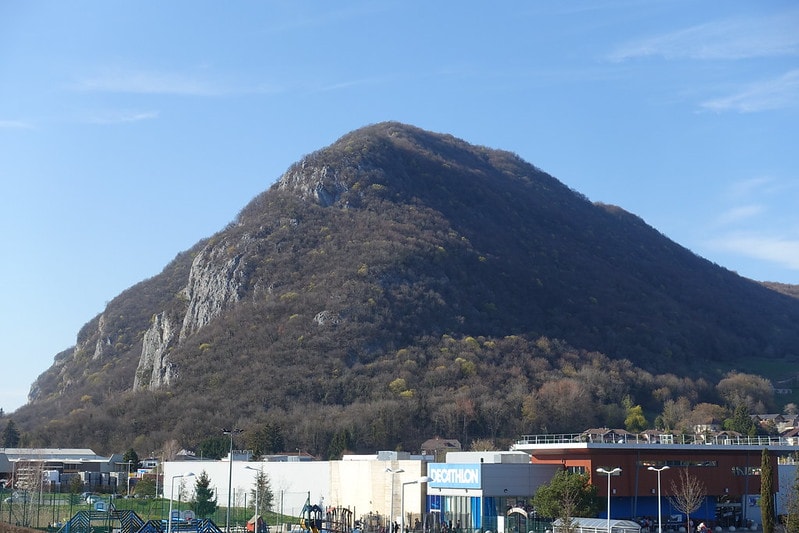 Some industrial zones are located in naturally attractive surroundings, like the Grand Épagny, with the Mandallaz Mountain near Annecy as a backdrop by Guilhem Vellut via CC BY 2.0
Some industrial zones are located in naturally attractive surroundings, like the Grand Épagny, with the Mandallaz Mountain near Annecy as a backdrop by Guilhem Vellut via CC BY 2.0Another mass shopping feature is the increasingly popular designer outlet village in France, which you'll find outside some provincial cities and which provide discounted brand goods.
Otherwise, French retailers rule, especially in smaller towns.
And no, you cannot really bargain for a lower price, unless you are at the market or buying antiques. For the rest, what is marked is what you pay.
SHOPPING TOURS IN FRANCE
➽ Shopping in Paris at Christmas : Festive Shopping Past & Present
Here are a few types of shop for your range of things to buy in France.
French department stores
All cities have department stores in France; in fact, they were invented in France and will feel familiar, wherever you are from. A few major chains can be found in many large cities...
Some are quintessentially French, such as Les Galeries Lafayette or Le Printemps, with branches across the country. Some are foreign imports, mostly from Japan, and mostly in Paris.
Shopping in a French department stores will be a similar experience to shopping in a store anywhere – various sections at different price points, with the one main constant: always say Bonjour to the salesperson or the door person when you arrive!
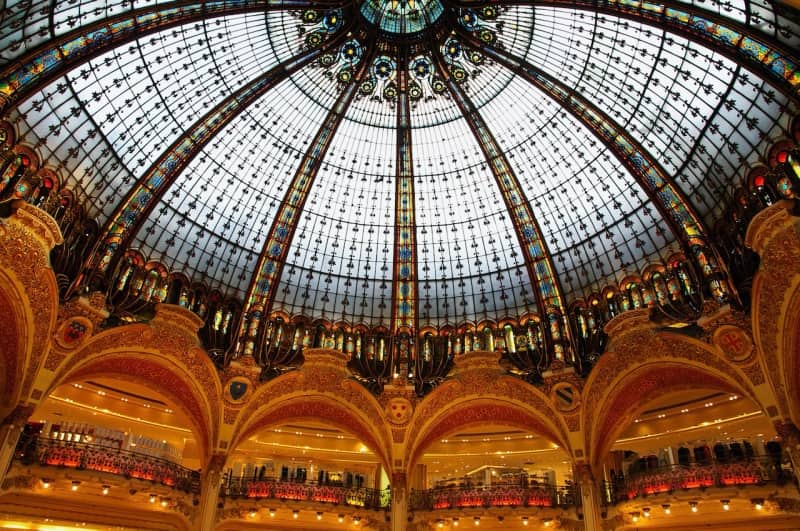 The Galeries Lafayette in Paris - one of the best shops in France
The Galeries Lafayette in Paris - one of the best shops in FranceFrench supermarkets
Supermarkets of all sizes are spread all over France, both in the countryside, the suburbs and the city centers.
The larger ones are called hypermarchés – hypermarkets in France – and are located in the industrial suburbs or in the countryside. You can find everything from groceries to houseware, clothing, and even books or DIY and sports accessories. Often, they have taken the place of smaller shops or, conversely, are providing services in rural areas that were not available before.
The most common supermarkets or hypermarkets are Carrefour, Auchan, Leclerc or Géant Casino.
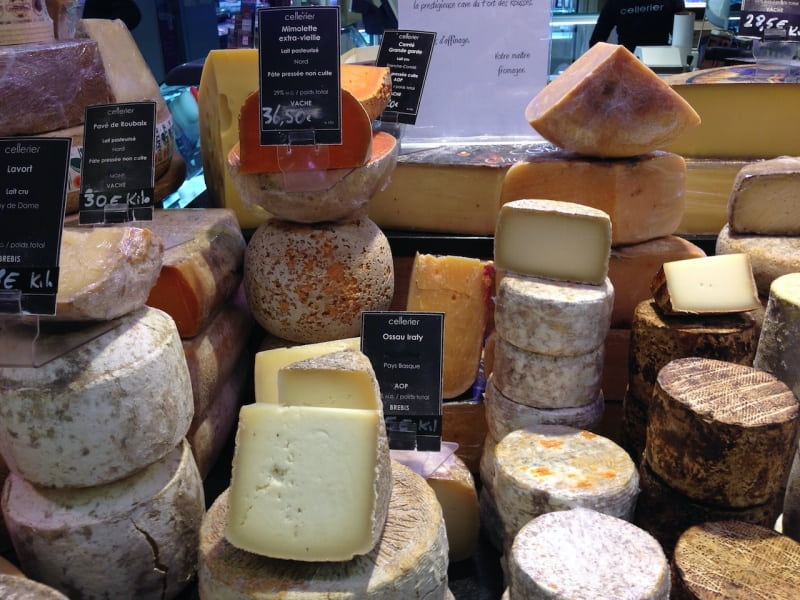
 Food shopping in France is usually delightful, whatever you buy
Food shopping in France is usually delightful, whatever you buyIf you have them from a previous shopping excursion, do bring your own shopping bag to the supermarket. The law now prohibits the distribution of free plastic bags and reusable bags are sold at the checkout counter.
If the supermarket happens to be located in a shopping center, ask for your parking ticket to be validated at the checkout to reduce or altogether avoid parking fees.
If you're from a country that accepts "cashbacks" – using your credit credit at the till to get some cash back – don't try it here: this does not exist in France, sadly.
As for paying, you can do so by cash, credit or debit card, usually Mastercard or Visa. Some shops still accept cheques as long as you can produce two pieces of identification.
French markets and French market towns
We still go to the market to buy fresh food when we can.
Most large villages or small towns have a weekly market – these are market towns –and if they don't, you will always find a market in a nearby city. Products are often fresher than at the supermarket, and cheaper. Plus, this allows you to support local economies because most of the produce is either local or regional.
Early in the morning, you'll find the greatest variety of foods, but at the end of the morning, prices will often go down as merchandise needs to be sold off.
 Grocery shopping in France can take place in specialty shops, markets, supermarkets or even department stores with a food section
Grocery shopping in France can take place in specialty shops, markets, supermarkets or even department stores with a food sectionDepending on the market, you'll find fruits, vegetables, cheese, meat, hams and dry sausages and local specialities. For example, in markets with a large North African or Asian customer base, you'll find plenty of spices and products you won't find in a more traditional French market.
These days, markets often carry more than just food. Some unusual sights include vans filled with mattresses for sale, or kitchen knick-knacks unavailable in the supermarket – the latest peeler or other innovation. Houseware and clothes are also often on display.
Please ask before touching anything, or look around and watch what other people are doing. In some markets, you can pick and choose your own produce but in others, you'll have to ask the producer to choose for you, or point if you see something particularly delectable.
Where choosing your own fruits and vegetables is acceptable, you may find small baskets or plastic bags for you to make your selection while queuing.
Note that prices can be quoted in several different ways, depending on the produce: by the unit, by the 100 grams (if very expensive) but mostly by the kilogram (kg).
If you can communicate a bit in French, producers are always happy to provide tips and even recipes on how to cook the product you are buying. Also tell them when you plan to eat something – you won't get the same melon if you plan to have it for lunch today as opposed to next Wednesday... So don’t hesitate to ask, even when there is a queue. Going to the market is not an experience to be rushed. If people wanted to shop quickly, they’d go to the supermarket.
SHOPPING TOURS IN FRANCE
➽ Private Vintage Shopping Tour at Saint-Ouen Flea Market in Paris
➽ Shop Paris like a local: Unique French handcrafted products
➽ Teenager Fashionista Experience: Personal Shopping and Styling in Paris
Industrial areas, outdoor malls and shopping centres in France
We mentioned these briefly above but increasingly, industrial areas are becoming prime shopping venues.
Usually they will group many large shops, from hypermarkets to furniture shops to the ubiquitous McDonald's. Electronics, lighting, DYI, kitchen builders and bathroom fixtures are just a few examples of what you'll find in an industrial area. While city buses usually go there, these areas are hard to navigate without a car. They have few pedestrian crossings, and much of what you can buy is too large to carry on your own.
These are usually unsightly, a composite of ugly commercial architecture but convenient for people who live in city centers and would not otherwise have access to these larger shops.
Traditional French shops: Where to shop in France
Despite the rapid growth of industrial areas, online shopping and hypermarkets that carry everything, France still has plenty of traditional shops to which residents remain faithful. Often, they are still grouped together on shopping streets, much the same way as they were a century or more ago.
Here are four typical types of shops in France that seem to be surviving modernization.
The French bakery - la boulangerie
Supermarket bread simply cannot compare to the real thing and we tend to buy it only if we have no option – if our village doesn't have its own bakery, for example, or if we are in a rush and can only go to one shop.
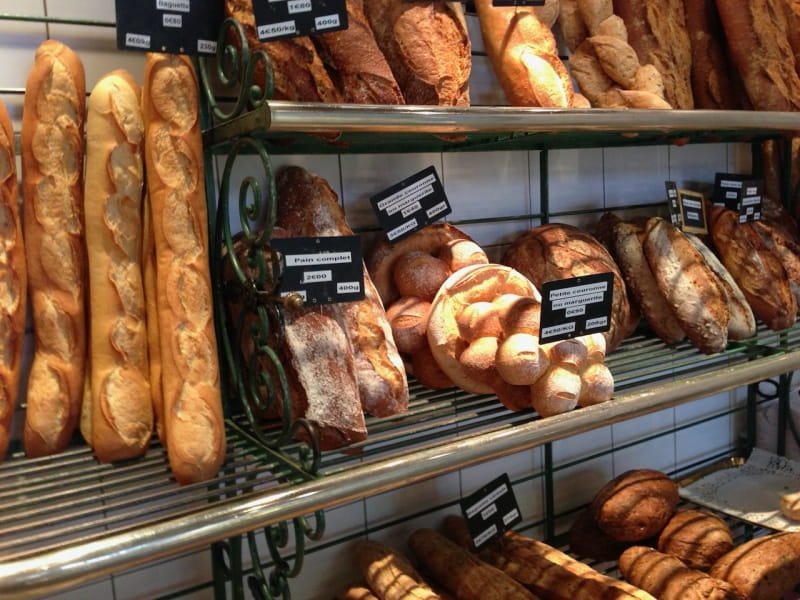 Essential shopping tips in France: say hello and goodbye when you arrive and leave
Essential shopping tips in France: say hello and goodbye when you arrive and leaveLook for the label Artisan Boulanger, which means the dough is made and baked on site. Without this mention, in a simple boulangerie you'll probably be getting bread whose dough was delivered early in the morning and baked in the bakery's oven, but no more.
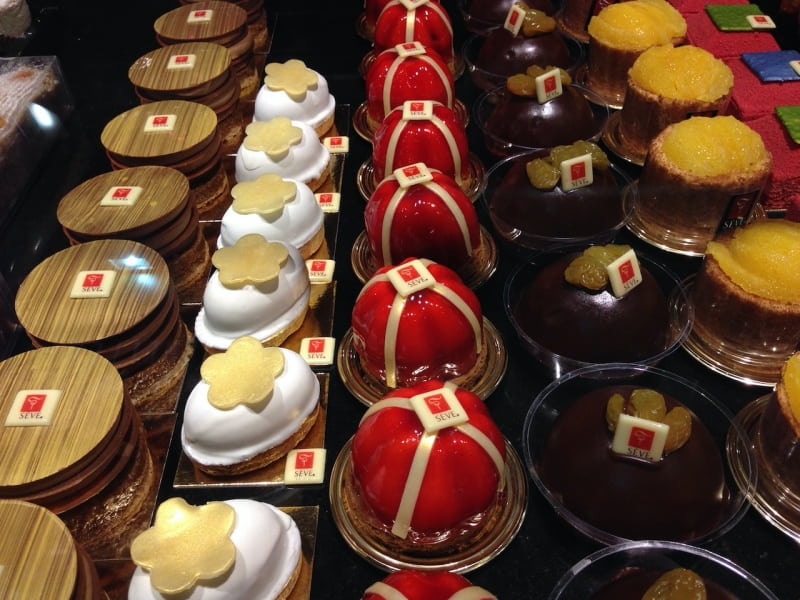 French patisseries can be as dazzling as jewelry shops
French patisseries can be as dazzling as jewelry shopsMost bakeries also sell pâtisseries, or pastries, but just because you're in an Artisan Boulander does not means the pastries are homemade to the pastry making. Therefore, if you want to be sure the cake you are buying for a French dinner party is not industrial, ask: "C'est fait maison?" Is it homemade?
While French bakeries are subject to the same opening hours as other food shops, you'll find they often open at 6am to catch the morning croissant or fresh bread trade and close late in the evening, at 8 or 9pm, for those who have been stuck in traffic and need to pick up some bread for a late dinner... As we know, a meal in France without fresh bread is unthinkable.
The butcher shop - le boucher
Local butchers are still quite common in France, and the quality of meat is usually far better than what you'll find in the supermarket – and a little more expensive.
Butchers are often talkative and will happily tell you how to prepare a specific cut of meat. They often provide a few cooked dishes as well, such as salads or regional specialities, so you can buy your entire meal in a single shop and sample food from the region as well.
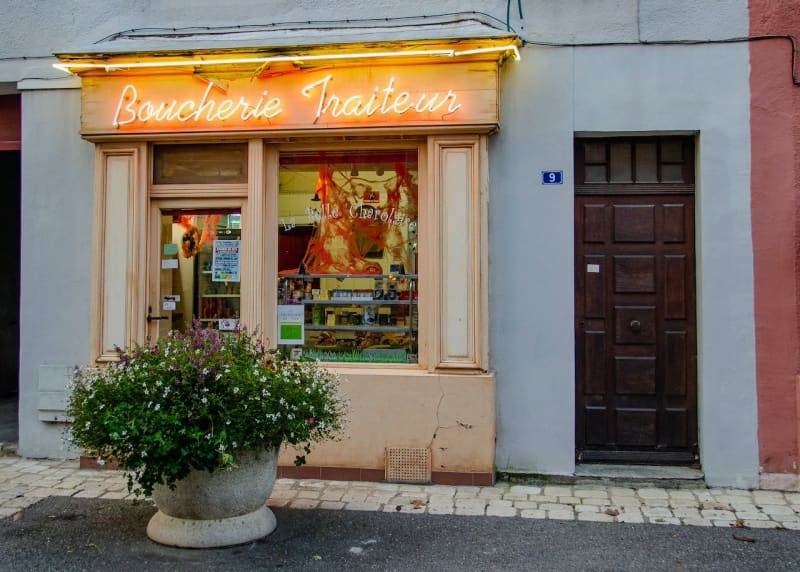
 France shopping: Those who can afford it in France often prefer to buy their cuts of meat and their charcuterie (cold cuts) from a specialized butcher rather than from a supermarket
France shopping: Those who can afford it in France often prefer to buy their cuts of meat and their charcuterie (cold cuts) from a specialized butcher rather than from a supermarketButchers are also becoming more specialised, with special 'bio' or organic butchers, or butchers that sell only from a few selected farms.
A final suggestion: pick up some charcuterie, or cold cuts, and a bit of pâté. And don't forget to ask if it's homemade.
The tobacconist - le tabac
From its name, this is clearly a shop where cigarettes and tobacco are sold. True, but it is also so much more.
The 'tabac' also doubles as a newspaper and magazine shop, often the only source of publications in a village. You can also find such things as postcards, stamps, stationery, toys or fishing equipment, depending on the village. Along with the local café, the tabac is often a town or a neighbourhood's repository of good gossip...
The most important reason to go to the tabac? To buy a lottery ticket, because that's where they're sold.
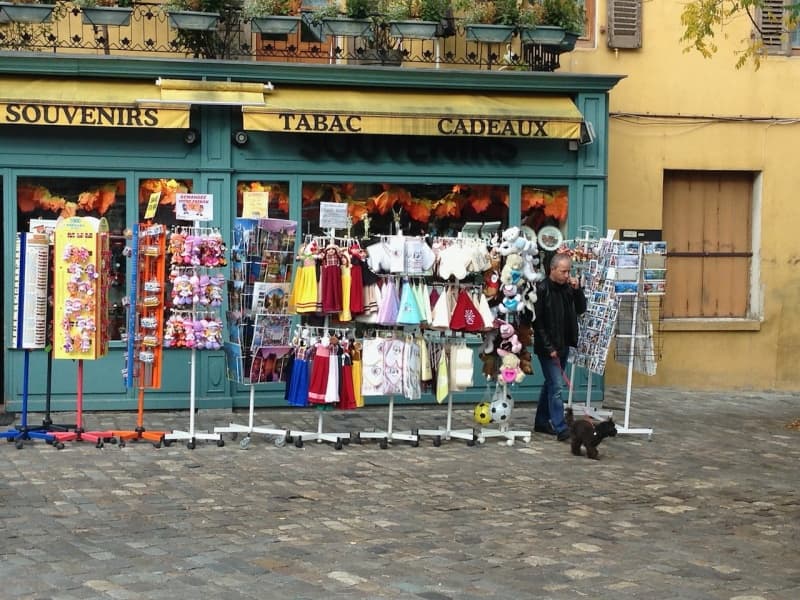 A typical tabac. With fewer people smoking, tobacconist shops are turning to many other items to keep their shops afloat
A typical tabac. With fewer people smoking, tobacconist shops are turning to many other items to keep their shops afloatThe shoe repair shop - la cordonnerie
This may seem a bit old-fashioned, but France still has its shoe repairs, for those of us who like to buy high-quality shoes and keep them in pristine condition with new heels or soles.
This is also where you get your keys duplicated, and of course buy all your shoe maintenance products, like polish or shine.
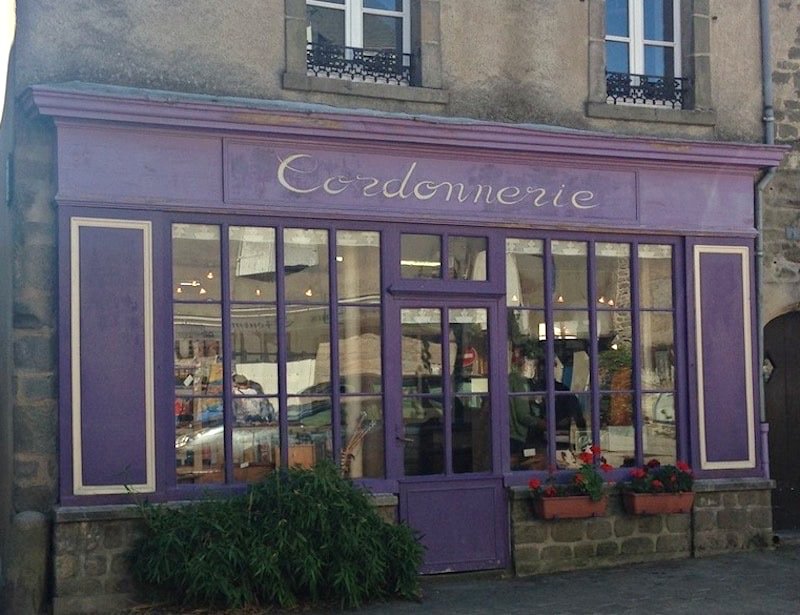 They are less common than they used to be but these small specialty shops still exist
They are less common than they used to be but these small specialty shops still existThere are more traditional specialised shops in France such as the fishmonger’s, the haberdasheries (notion store in the US), creameries (cheese shops), wine shops, milliners… It’s like a trip to the past for some visitors but remains a habit in every day shopping in France life!
French drugstores
Forget any notion you may have had of a pharmacie (pharmacy in French) – in France, they are quite different from other countries as they only sell medicines and personal care products.
Most medication is available behind, not over the counter.
Medicines come in their own boxes with the posology, so you often end up buying more than you actually need, contrary to North America, where the pharmacist counts out the precise number of pills for you. A doctor’s prescription is needed for a large number of medicines, but you still can ask the pharmacist for medical advice to the pharmacist. Also, some medicines are available without a prescription but if you have one, you will be better reimbursed by French healthcare if you are registered.
French pharmacies are easily spotted from afar, with their brightly lit green neon cross. If the light is not flashing, the pharmacy is closed. If you have a urgent need for medecine on a Sunday, you will find a list of open pharmacies on the nearest pharmacy window.
For a wider selection of personal care products, try a parapharmacie, which only sells over-the-counter medicine, not prescription.
French clothing shops
Other than food shops, one of the most popular types of shops are accessory and clothing stores in France. Of course you can head directly to a department store but if you want designer clothes or something slightly different or special, a boutique or small shop is the place to go. Plus, a specialist will know the product inside out and you may experience some of the best shopping in France this way.
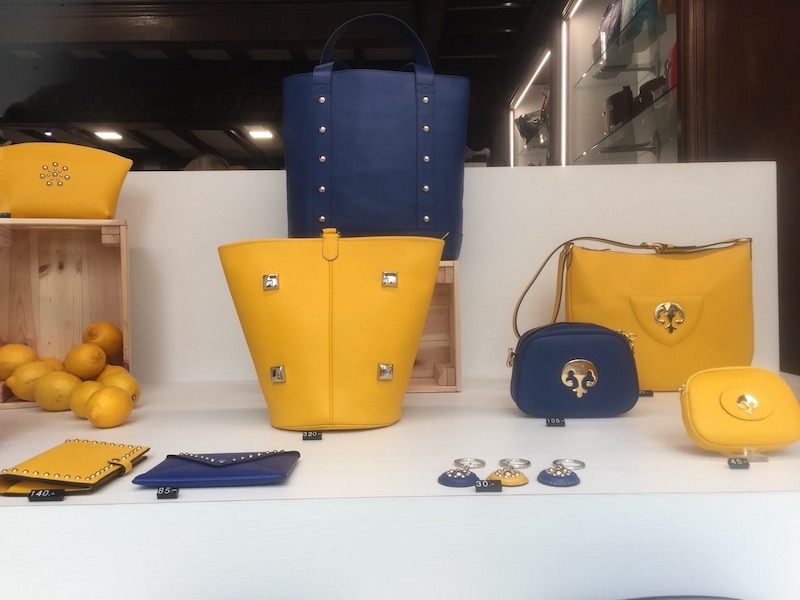 Handmade French leather bags by Maison Laffargue
Handmade French leather bags by Maison LaffargueThis being France, you can buy clothes almost anywhere: food markets have clothing stalls, flea markets sell vintage clothes, supermarkets often have clothing departments... but mostly, we do our clothes shopping in department stores, boutiques or, increasingly, online.
Sales assistance in French clothing shops
In small boutiques, the client should always ask for permission before touching merchandise, whereas in larger shops and chains, it is perfectly acceptable to go through clothes racks to look for your size. By the way, find out your French size beforehand because shop assistants won't necessarily know about size conversions.
Once you've found your dream French outfit, ask for permission to go to the cloakroom. Chances are you won't even have to – you'll be guided there directly.
How to get honest feedback from French sales staff
If you ask, shop assistants will tell you whether a particular piece of clothing suits you or not. Don't expect them to ooh and aah unless you look truly spectacular. Telling the truth is not considered rude, but seen as honest feedback. No French shop would want you to buy something that you'll hate the moment you get home...
A final word: Good news for American customers, anywhere you go the price you see on the tag is the final one. The VAT is already included and no extra tax will be added at the checkout.
A short lexicon if you want to shop in French
- hello – bonjour
- goodbye – au revoir
- please – s'il vous plaît
- thank you – merci
- the shops– les magasins
- department stores– les grands magasins
- the market – le marché
- the butcher's – le boucher
- the creamery – la crèmerie
- the fishmonger's – la poissonnerie
- the bakery – la boulangerie, la patisserie
- the millinery – la chapellerie
- the tobacconist– le tabac
- the shoe repair– le cordonnier
- the haberdashery – la mercerie
- the flea market– le marché aux puces
- the supermarket – le supermarché
- the hypermarket – l'hypermarché
- the pharmacy or drugstore – la pharmacie
- sales – soldes
- I would like– je voudrais
*Guillemette Rony blogs at Expat in France, where she helps English-speaking expatriates settle in France and deal with such French administrative issues as immigration, healthcare, housing and everything in-between.
Did you enjoy this article? I'd love if you shared it!
Pin these and save for later!
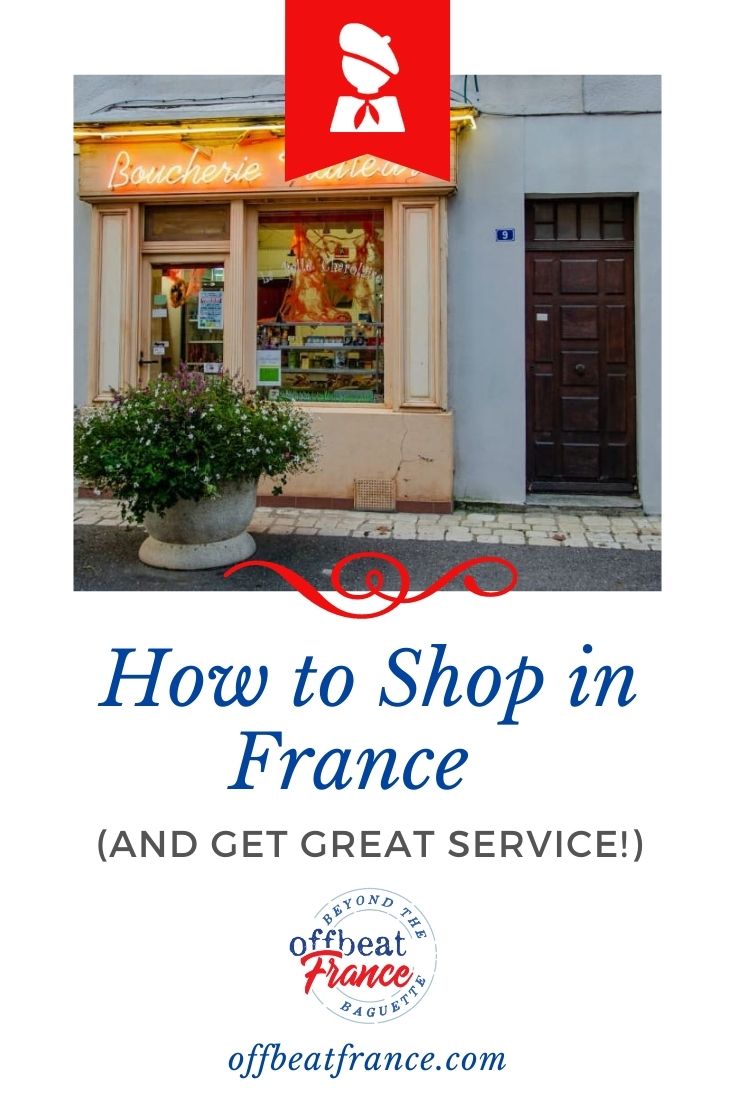 |
 |


